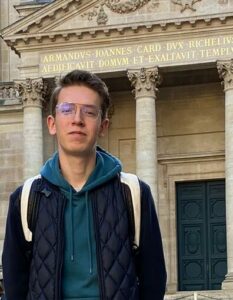Panthéon-Sorbonne (Paris, France)
Jelle Lammerts van Bueren, Panthéon-Sorbonne
Paris, France – November 2022
When I first entered the Centre Pierre-Mendès-France in the 13th Parisian arrondissement, I felt utterly confused. The building, carrying the name of one of France’s early presidents, serves as an administrative facility of the Université Paris 1 Panthéon-Sorbonne and is a complete maze to the unknowing foreign student. To illustrate, every elevator leads to a different floor, and a room might have three different names depending on the faculty you are in. This resulted in me taking the wrong elevator, consequently ending up on the wrong floor, looking for a room that, according to my faculty, did not even exist in the first place. When asked why this system was in place, a professor simply answered: “mesdames, messieurs, vous êtes en France maintenant.”
At the beginning of the RMA program, I was not sure if I wanted to spend five months studying at a foreign research university. To be honest, the daring challenges that come with living and studying abroad slightly frightened me. Besides, I was not sure where to go, as my research interests were rather scattered. This changed, however, when I (re)discovered the historical topic that interests me the most during the well-known “Fundamentals of Historical Research” course. I have always had a weakness for French history and especially the democratic development of the French Republic in comparison to that of other European states fascinates me tremendously. The topic made me curious about the French and Francophone academic world and after discussing it with my mentor I decided that the best way to learn more about French history was to emerge myself in its surrounding academic system.
“Mesdames, messieurs, vous êtes en France maintenant.”
The university that immediately spoke to me was the Parisian Panthéon-Sorbonne University, also known as Paris 1. With its strong focus on societal and cultural backgrounds of political thinking and various courses that are dedicated to investigating the politics of contemporary societies, the institution felt like a complementary element to the courses that I had already taken at Utrecht University. Additionally, the university offered a French historiography course and an introduction to the French archives that I am hoping to use for my thesis.
In my view, the main takeaway from spending some time at a foreign research university is that it allows you to experience another academic culture, in my case the French one. Although there are many similarities between the “Anglo-Saxon countries” – as the French call Germany, the Netherlands, and the United Kingdom – and the French system, there are also subtle differences. The meticulously detailed approach to historical issues, the attention that French students pay to memorizing complete (French) historiographical overviews, and the focus they put on the author as an individual surprised and also inspired me.
In short, time abroad teaches you how to navigate your route into a new academic system and provides you with historical and historiographical knowledge that you might never learn at home. Sadly, it does not teach you how to navigate the halls of the Centre Pierre-Mendès-France. I still have to use a map when I go there.

<- Jelle at Rue de la Sorbonne

